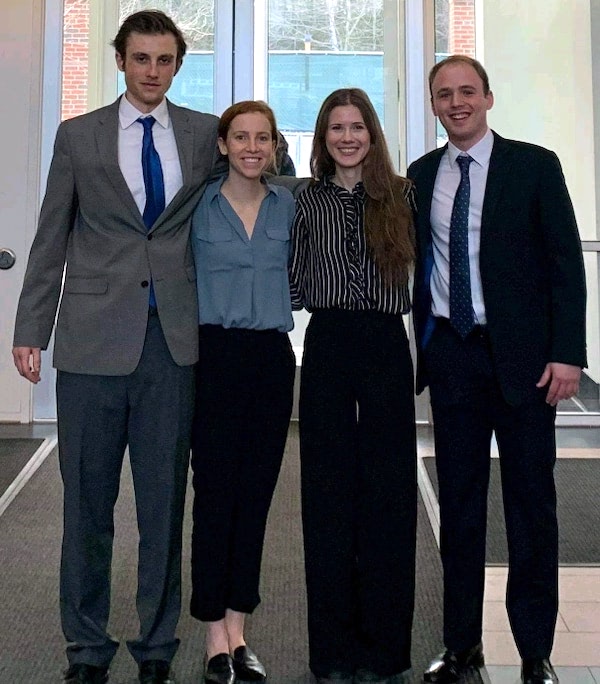- Undergraduate
Bachelor's Degrees
Bachelor of ArtsBachelor of EngineeringDual-Degree ProgramUndergraduate AdmissionsUndergraduate Experience
- Graduate
Graduate Experience
- Research
- Entrepreneurship
- Community
- About
-
Search
All Thayer News

l to r: John Greene ’20, Caroline Goggins ’20, Evangelia Stoikou, and Henry Talma Stheeman ’20
Students Win at Solar District Cup with Engineering Design Capstone Project
May 12, 2020 | by Julie Bonette
Dartmouth engineering students Caroline Goggins ’20, Evangelia Stoikou, Henry Talma Stheeman ’20, and John Greene ’20, along with their faculty advisor, Dean Alexis Abramson, recently took home a prize at the US Department of Energy (DOE) Solar District Cup competition.

l to r: John Greene ’20, Caroline Goggins ’20, Evangelia Stoikou, and Henry Talma Stheeman ’20
The Solar District Cup challenges multidisciplinary student teams to design and model optimized distributed energy systems for campus or urban districts, according to the DOE. The competition engages students across the engineering, urban planning, and finance disciplines to reimagine how energy is generated, managed, and used in a district. Student teams were randomly assigned one of three districts.
“These students have backgrounds in a variety of academic disciplines, and that diversity is critical to supporting America’s changing energy landscape,” said Assistant Secretary of Energy Efficiency and Renewable Energy Daniel Simmons in a press release announcing the winners. “The Solar District Cup helps prepare these students for jobs in the solar industry.”
The team from Dartmouth won first place in the Crystal Parks district, which is a group of five buildings in Arlington, Virginia, owned by JBG Smith; the company acted as a sponsor and judge of the students’ work.
The students designed a complete solar system for the district, including a conceptual system design, a distribution impact analysis, financial analysis, and development plan. The end result was a recommended complete solar photovoltaic (PV) system design for the real estate developer. The students also tapped contacts from previous internships to speak with industry experts about their ideas.
“Our group was very productive in working together, even after it got harder to coordinate when things went virtual. We all have different skill sets and were working really hard to get the work done,” said Stoikou, who mentioned that they worked on the project from September through March. “I want to work in the renewable space eventually, so it was a good project to get experience.”
Last fall, approximately 65 teams entered the competition, but only 35 were invited to virtually present and submit their final solution to a panel of judges late last month. The four Dartmouth students, all of whom are pursuing their Bachelor of Engineering degrees, took part in the competition as part of their two-term capstone design course sequence.
“This project helped us to develop transferable skills that will allow us to be players in the mass adoption of renewable energy in our future careers, a necessary step to curb carbon emissions and fight climate change,” said Goggins.
For contacts and other media information visit our Media Resources page.
